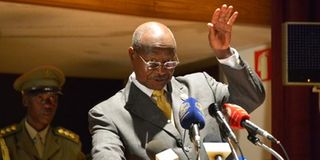Prime
Machar’s fighters kill UPDF soldiers

President Museveni addresses heads of state during the International Conference on the Great Lakes Region in the Angolan capital of Luanda yesterday. PPU PHOTO.
What you need to know:
Ugandan soldiers were killed and others injured when the UPDF engaged the rebels just 90 kilometres outside Juba.
KAMPALA.
President Museveni yesterday revealed that the Uganda army is actively fighting rebels led by Riek Machar in South Sudan. He also disclosed that Ugandan soldiers were killed and others injured when the UPDF engaged the rebels just 90 kilometres outside Juba, just a day before Parliament approved Uganda’s deployment in the world’s youngest nation.
“Only the other day, January 13, the SPLA and elements of our army had a big battle with the rebel troops about 90km from Juba where we inflicted a big defeat on them,” Mr Museveni told fellow regional leaders in Luanda, Angola. “Unfortunately, many lives were lost on the side of the rebels. We also took casualties and had some dead,” he added without giving figures.
Claims confirmed
The admission by President Museveni that Uganda is fighting on the side of President Salva Kiir confirms claims by MPs that Uganda was actively involved in fighting in South Sudan and had lost soldiers in the crisis that started December 15 in Juba.
The army had severally denied it is involved in any combat operations in South Sudan.
Questioned about the developments, Defence minister Crispus Kiyonga deflected the question to the army spokesperson, Lt Col Paddy Ankunda, who said: “Well, the President has said it.” He added: “Details are scanty at the moment but all I can say is that our forces had a very successful battle.”
Speaking at the International Conference on the great Lakes Region, Mr Museveni said by yesterday evening, the government of South Sudan, with the support from UPDF, had regained control of Jemeza. He also accused former south Sudan vice president Machar of planning and executing the failed coup. “… the question is: “If Riek Machar did not plan a coup in Juba, then why did his supporters capture Malakal, Bor, Akobo, etc?” ...”
Museveni condemns rebels
“In my opinion, if Machar had not planned a coup and it had all been mistakes on the government side, he could have done two things: withdraw to a remote area of the country to avoid attack and start talks unconditionally so as to resolve the problem quickly and not to protract it,” said Mr Museveni.
According to President Museveni, the crisis is a result of power struggle and “You detect ideological, organisational and discipline issues in this situation.” He also blamed the fighting on the indiscipline of the SPLA soldiers.
The SPLM party, the President said, should resolve their disagreements within the party structures, and advised that those dissatisfied should form their own party. The conference attended by presidents Uhuru Kenyatta of Kenya, Paul Kagame of Rwanda and host Eduardo Dos Santos of Angola, also discussed the fighting in the Central Africa Republic and DR Congo.
The President’s remarks drew condemnation from the Shadow Attorney General Abdu Katuntu.
Mr Katuntu said the MPs will task the Executive to explain and account for Ugandans they put in harm’s way by engaging in combat.
By taking sides, he said the government had pitted Ugandans against ordinary South Sudanese.
“As Parliament, we need to take steps immediately now that we know we were lied to. We want the Executive to account for Ugandans they took in and put in harm’s way in the conflict because they got our approval fraudulently,” said Mr Katuntu.
Comment > From Barbara Among
President Museveni’s revelation, a day after our Parliament overwhelmingly stamped a motion tabled by Defence minister Crispus Kiyonga, to retrospectively ratify the UPDF deployment in the world’s youngest nation has once again left the MPs holding the can.
One wonders how irrelevant our Parliament continues to play on issues that need its oversight.
The MPs passed the motion on the premise that the deployment was for peace enforcement purposes, with the responsibility of evacuating Ugandans too and concerns about the dangers of taking a partisan stand raised by Mr Wafula Oguttu, the day’s Leader of the Opposition, were casually brushed off.
President Museveni’s position, however, reveals a long known public secret; Uganda has taken a stand against Riek Machar and his group - a matter that will worry many a Ugandan with or without interests in South Sudan.
But is South Sudan’s conflict a military one that Uganda’s army can resolve or a political problem that Uganda will now aid to quickly turn into a military problem?
The current crisis was destined to befall South Sudan. A chronology of events that preceded the December 15 alleged coup attempt indicates that President Kiir had long fallen out with his then deputy and several other top SPLM leaders.
The brewing dispute was a time-bomb waiting to explode. The grudges went public before the much celebrated July I, 2011 independence. It is noble to have solution to the problems in one of our strategic regional partners, but by taking drastic partisan military action, Uganda stands to lose in many ways in the long-run.
Ms Among is the Daily Monitor’s Diplomatic Affairs Editor, responsible for Regional and Foreign content



